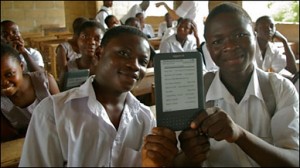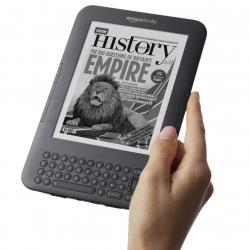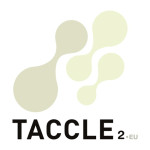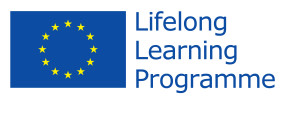 Lots of teachers we worked with were initially very unhappy about the use of Kindles or other e-readers in the classroom. Some felt they worked hard with their pupils to develop a love of books and e-readers were, in some strange way, threatening this. It took a while to convince them that the ‘books’ still existed, independently of the medium they were stored on. We are convinced that children should learn that ‘books’ come in many forms; paper based, readers that use electronic ink (such as Kindles), on a tablet, on a smart phone, on a computer monitor. They are all ways of accessing books and can – and should – co-exist quite happily in the classroom. This is especially important for those kids who have a mass of electronic devices at home but maybe no paper based books.
Lots of teachers we worked with were initially very unhappy about the use of Kindles or other e-readers in the classroom. Some felt they worked hard with their pupils to develop a love of books and e-readers were, in some strange way, threatening this. It took a while to convince them that the ‘books’ still existed, independently of the medium they were stored on. We are convinced that children should learn that ‘books’ come in many forms; paper based, readers that use electronic ink (such as Kindles), on a tablet, on a smart phone, on a computer monitor. They are all ways of accessing books and can – and should – co-exist quite happily in the classroom. This is especially important for those kids who have a mass of electronic devices at home but maybe no paper based books.
We also found that Kindles offer some additional benefits. In particular, slow or ‘reluctant’ readers quite often take to e-readers because tend to lose the meaning of the text far more easily and get bored. We found that choosing books with a speech synthesiser and allowing them to switch it on when they started losing track of the story or were getting tired renewed their interest.
In addition…
- they do not associate them with previous history of ‘failure’
- they can be shown how to adjust the font, the font size and the page orientation so that they can choose the combination they find easiest.
- if they get stuck on a word they can (in many books) turn on the sound so that they can hear the word spoken
- if they do not understand the meaning of a word they can click it to find a definition
- they can make a mark or comment in the margin to note any bits they don’t understand, which the teacher can then follow up
- they just like gadgets!
We have also used Kindles to
- Select particular words e.g ‘find five adjectives’, ‘find three words you didn’t know’ using the mark up function
- select a particular word and write its meaning as a margin note then check their definition against the Kindle dictionary definition
- use the Amazon Kindle store to explore different ‘genres’ and different ways of classifying books
- looked at some of the book synopses then write their own for a book of their choice
Another easy idea is to save children’s own stories as pdf files and upload them onto a Kindle for other children to read
This post is also available in: Dutch, German, Italian, Spanish, Romanian, Welsh




 English
English Nederlands
Nederlands Deutsch
Deutsch Italiano
Italiano Español
Español Português
Português Română
Română Cymraeg
Cymraeg
Sounds interesting and …valuable for a class. Unfortunately couldn’t dream of it – not to try it! A Kindle is very expensive. I am rural teacher and the price for this device it’s a month salary of a parent. The school can’t afford to buy it, either.